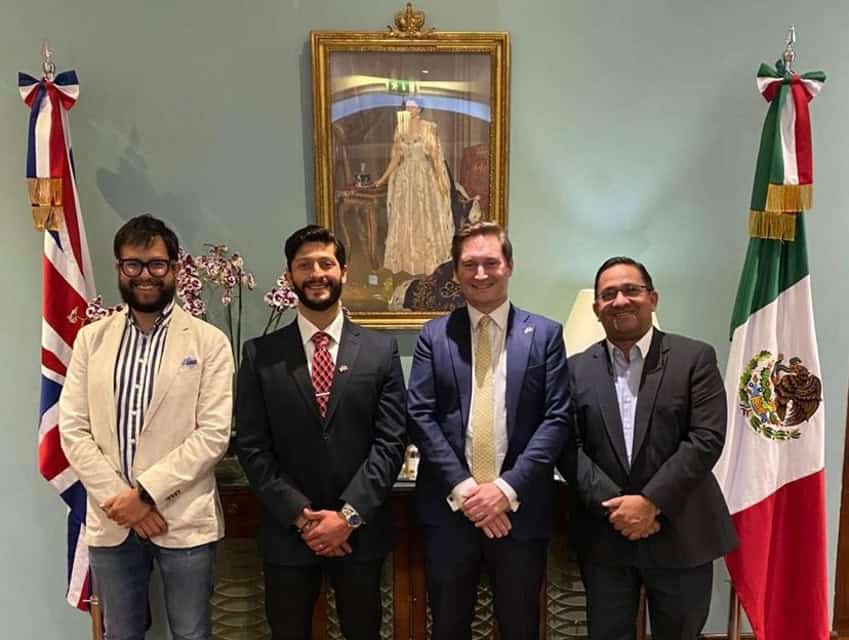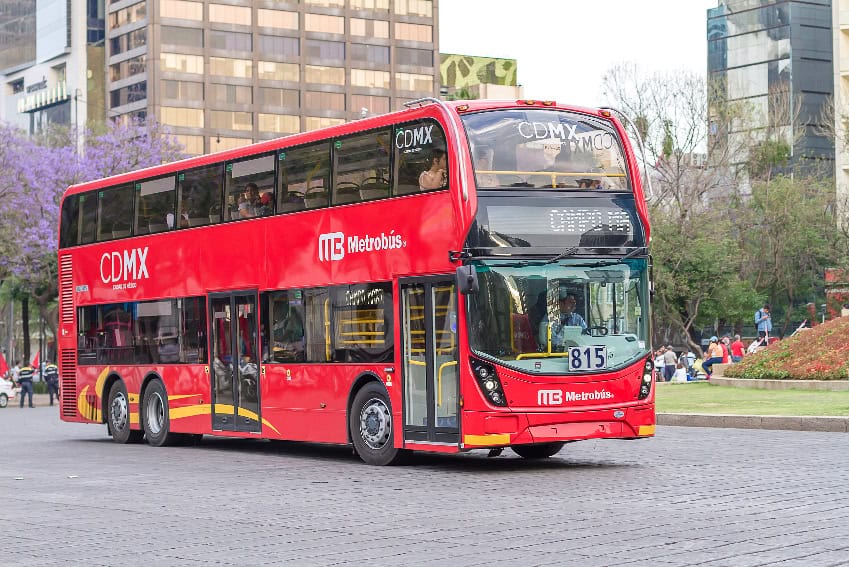With trade links between Mexico and the United Kingdom booming, Mexico News Daily spoke with Spencer Mahony, His Majesty’s Deputy Trade Commissioner for Latin America and the Caribbean, about the future of business between the two nations.
How do you perceive Mexico’s role and significance in the global economy, especially concerning its trade relationships?
Mexico matters now and will matter even more in the future. As a rapidly growing member of the top 15 global economies, Mexico is a key player, particularly because of its extensive network of trade agreements and strategic geographic location.

Mexico has 13 Free Trade Agreements (FTA) with over 50 countries — including the USMCA, CPTPP (which the U.K. is joining), and Pacific Alliance — which provides the country with access to global trade and supply chains across Latin America, Europe, and Asia. Mexico has also emerged as a major manufacturing hub, particularly in the automotive, aerospace, electronics, and medical device industries. Its location and skilled workforce continue to attract huge foreign investment interest. It is no wonder that multinational companies, including many British ones, have established production facilities in Mexico to take advantage of these factors.
Thus, it is no surprise that the world is looking at Mexico, and for us, it is and will continue to be an attractive and dynamic country for U.K. companies to explore, invest and partner with.
Can you provide an overview of the current presence of U.K. businesses in Mexico, including the sectors they are operating in and the scale of their operations?
Trade between the U.K. and Mexico has increased to record levels. In 2023, bilateral trade reached a value of US $8.2 billion, an increase of 22.3% compared to 2022. As for investment, the U.K. is also improving its performance in Mexico as we are now a leading source of foreign direct investment (FDI).
Currently, U.K. companies are operating in Mexico in sectors including tech, infrastructure, automotive, advanced manufacturing, financial and professional services, retail, food and drink, energy, creative and education, life sciences and security, defense and aerospace. In the last five years, British investments have amounted to more than US $5.11 billion and support nearly 50,000 jobs in the country.

From Sonora to Chiapas, British companies are considering how they can grow their presence in Mexico, driven by nearshoring. At the British Embassy, we see many areas of shared opportunity between the U.K. and Mexico. Our role is to spot opportunities and connect companies and investors to explore partnerships. We run dozens of programs with hundreds of companies each year highlighting opportunities in Mexico and opportunities in the U.K. for Mexican companies.
One of our challenges is a lack of knowledge about the strengths the U.K. and Mexico have; ultimately trade and investment are about people connecting and having confidence to partner to do new things. Our people-to-people links are growing, and we find once we have got U.K. companies to visit Mexico, they want to come back and do business.
What are some success stories or notable examples of U.K. companies thriving in the Mexican market?
As the U.K. was the first country to go live with Open Banking, we have collaborated with Mexico’s financial services sector towards financial inclusion. It was brilliant to see that Revolut recently obtained its banking institution license from Mexico’s National Banking and Securities Commission, their first outside Europe.
Keeping consumers and companies safe is something the U.K. has invested in heavily for many years. I suspect not many readers will have heard of Darktrace, but they are a U.K. AI-powered cyber company that is doing some brilliant work keeping businesses safe. Similarly, Featurespace is helping financial organizations avoid fraud. British Telecom is providing global communication networks for some of Mexico’s most international companies who need safe and secure networks. We can all spot iconic U.K. brands such as Burberry boots, Mini Cooper cars or Phenhaligon’s fragrances, but many of our most successful businesses are more B2B than B2C.

In Mexico, British pharmaceutical companies such as AstraZeneca, Haleon and Reckitt have a strong presence in the country through increased portfolios and manufacturing plants that allow them to not only provide innovative products in the Mexican market but also export for U.S. and Latin American consumers. It’s inspiring to see their efforts to employ more women, make manufacturing more resource efficient and create more employment and growth opportunities.
Within the food and drink sector, there are well-known successes with iconic spirits like whisky and gin from British companies such as Diageo, William Grant and Sons and Edrington. We also have U.K. beers from Samuel Smith Brewery, Brewdog and Shepheard Neame doing well in Mexico’s highly competitive drinks market. Finally, one of the sectors I care about most is education. Our team has supported U.K. companies such as Pearson, Cambridge English, and Oxford University Press, as well as other small-medium enterprises such as Little Bridge, Manga High and Twig, to expand their presence in Mexico’s educational system. We think bringing high-value-added education products and services is key to supporting Mexico’s talent and growth.
In the next three years, how do you view Mexico’s economic potential for British businesses, which sectors do you believe hold promise for collaboration and investment, and how do recent shifts in trade dynamics impact the U.K.’s trade relationship with Mexico?
The potential is huge, and we are fortunate to have complementary areas of expertise. The U.K. is a science and technology superpower, so we are identifying where we can bring innovation to support sustainable development and growth. There are many more technologies across many sectors that we want, and are bringing. U.K. cybersecurity companies will better keep consumers and businesses safe. Our Agri-Tech will enable Mexico to produce more food more sustainably, our EdTech can help raise education standards, and MedTechs improve health outcomes.
The U.K. is still one of the world’s largest manufacturers, but the next wave of U.K.-Mexico collaboration will be in technology-driven services or high-value niche products. These technologies will help Mexico’s largest companies grow more efficiently to consolidate their position on the world stage. Companies going truly global will use the U.K. to access its skills, science, finance and professional services.
It’s worth noting the potential for U.K. investment and support for Mexico’s infrastructure. We expect to see continued interest in the energy sector. In January, U.K.-headquartered Cubico announced additions to its pipeline of projects that bring its Mexico total pipeline to 2.2GWs. No doubt there will be interest from others to meet the increased need for power and transmission capacity as nearshoring increases.
The U.K. has made an industry of high-value-added consultancy that is delivering some of the world’s biggest infrastructure projects with partners. In Peru, for example, we are helping the government build schools and hospitals. As well as helping to design, project-manage and deliver infrastructure, we can also bring financing through U.K. Export Finance. We have US $4 billion available for Mexico and hope in the future we can support more projects in the country.

The advanced engineering sector and electric mobility are obviously a key opportunity. The red double-decker buses on Reforma Avenue in Mexico City are from Scotland, and we could see electric or hybrid buses designed in the U.K. in Mexico in the future. U.K. companies are actively considering investments in the auto sector in response to nearshoring. As mentioned earlier, U.K. pharmaceutical companies represent one of the U.K.’s strongest sectors in Mexico, and we have recently been through a wave of expansions.
I should mention again that we’ve been working on the ratification of the Comprehensive and Progressive Agreement for the Trans-Pacific Partnership (CPTPP) and think this will help stimulate further interest and investment in Mexico.
Dan Carden, the Prime Minister’s Trade Envoy to Mexico, noted on his visit to Mexico in March how trade agreements and better business-to-business ties will grow our trading relationship. We also see potential growth for British companies across all sectors, and that includes sectors such as food and drink and the creative industries, where Mexico is a fast-growing market for content consumption and creation. We are the world’s sixth largest economy, so the opportunities do span across the whole economy.
Finally, I suspect behind your question is interest in whether Brexit is relevant to future trade prospects. In short, I think it is. Firstly as companies are being encouraged to think more globally and secondly because our CPTPP membership was enabled by us being free to negotiate our membership outside of the E.U., and the same applies to a future trade deal with Mexico. Both deals should make a difference, and companies I talk to are thinking more globally about where future growth will be, and that naturally includes Mexico.
Regarding the U.K.’s relationship with Mexico and the significance of historical ties and the need for a modern approach to bilateralism: how do you perceive the evolution of this relationship, and what do you believe are the key factors driving its current trajectory?
This year, the U.K. and Mexico are celebrating 200 years of diplomatic relations. We’ve worked together to address mutual challenges, and we share strong cultural ties in areas like music, gastronomy, film, sports and education. Our historical bond has led us to achieve incredible results across our partnerships and joint initiatives on climate, political, economic, social and educational issues.
One of the factors that is driving forward our collaboration and partnership is our interest and commitment to develop exciting new areas of cooperation. For us, it is important to find areas of cooperation with the public, private and nongovernmental sectors to tackle challenges like climate change and bolstering clean energies, eliminating gender pay gaps, protecting human rights, and pushing for a safe use of artificial intelligence.
Another element that we are sure will have a positive impact on the U.K.-Mexico relationship and drive it forward is our accession to the CPTPP and a future new trade agreement between Mexico and the U.K.
How do you envision the U.K.’s role in providing meaningful assistance with significant challenges such as insecurity and climate change? What steps do you plan on taking to advance this?
There are many areas where the U.K. and Mexico are already collaborating on important issues like climate change, gender equality, human rights and cybersecurity.
One way the U.K. has become a strategic partner for Mexico is through the U.K. Partnering for Accelerated Climate Transitions (UK PACT) program. We are working with state governments to support them with technical capacity and highly specialized expertise to develop and update their environmental laws and regulations. To date, 11 states have passed legislation to help Mexico’s communities protect their ecosystems and address environmental challenges. In addition, we supported Mexico City, Guadalajara and Monterrey with technical assistance for the electrification and upgrading of their Metrobús, Trolleybus and Cablebús units.
Another example of our collaboration is our actions to protect and promote human rights. The first Multilateral and Human Rights Dialogue between Mexico and the United Kingdom was held in January, where we had fruitful and constructive conversations on strengthening efforts on a number of shared multilateral and human rights priorities, including gender equality and the protection of economic, social and cultural rights.
On cybersecurity and artificial intelligence, the British Embassy’s Science and Innovation Network in Mexico has collaborated with the National Alliance of Artificial Intelligence and the Mexican Academy of Cybersecurity and Digital Law to create a regulatory framework for the responsible use of AI. Part of this effort was the presentation of results from the Regulatory Sandbox Project and the current state of AI in Mexico, which was a joint initiative to foster responsible innovation in this field.
I am sure the strong partnership that Mexico and the U.K. have will only continue to get stronger.
To read more in the Global Mexico: UK in Focus series, click here.
